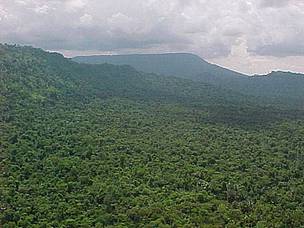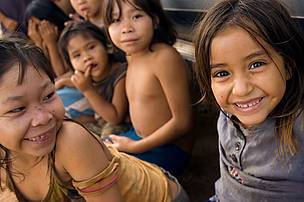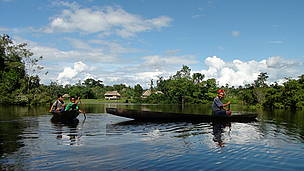WWF welcomes UN report underlining symbiotic relationship between people, biodiversity and sustainable development
WWF welcomes a new report, released by John Knox, Special Rapporteur on human rights and the environment for the United Nations, on the issue of human rights obligations relating to the enjoyment of a safe, clean, healthy and sustainable environment.

A wealth of biodiversity dwells within the forests of Pangsida National Park
By helping provide food, water, clean air, stable climate and even medicines, biodiversity and healthy ecosystems underpin human health and well-being. The Special Rapporteur’s report, released at the ongoing Human Rights Council session in Geneva, acknowledges the importance of ecosystem services and biodiversity for the full enjoyment of human rights.

Group of indigenous children in the zone of the reservation Mbaracayu
“Biodiversity holds the key to all life on Earth,” said Marco Lambertini, Director General of WWF International. “The Special Rapporteur’s report highlights a philosophy that guides WWF’s work on the conservation frontlines in over 100 countries: sustainable and equitable development is only possible when we ensure people and nature thrive together.”

Indigenous communities use the resources of nature
While there are several connections between biodiversity and healthy human life, the new report focuses on four areas specifically – those relating to medicinal drugs, microbial diversity, infectious diseases and mental health. It also outlines the role biodiversity plays in providing food, water and vital ecosystem services to communities worldwide, especially indigenous peoples, forest-dwellers, fisherfolk and others who are directly dependent on forests, rivers, lakes and oceans for their lives and livelihoods.
“Across the globe, healthy ecosystems are the foundation for healthy societies and for achieving a sustainable, climate-resilient future for all,” added Lambertini. “As biodiversity declines at an alarming rate and the impacts of climate change accelerate, we must act together to protect ecosystems and safeguard the rights and development of the communities most at risk.”
The Special Rapporteur’s report identifies habitat loss and degradation, over-exploitation, pollution, invasive species and climate change as the top drivers of biodiversity loss. WWF’s Living Planet Report 2016 showed how these threats, linked either directly or indirectly to human activity, have caused a 58 per cent decline in global wildlife populations between 1970 and 2012, the most recent year with available data.
The result of several months of expert meetings, thematic discussions and a public consultation, the Special Rapporteur’s report consists of key recommendations for governments on fulfilling their obligations to protect ecosystems and biodiversity, and to provide a safe and enabling environment for those who speak out in defense of biodiversity. The Special Rapporteur also calls on corporates to respect human rights in their biodiversity-related actions, and on conservation organizations to increase their efforts to fulfil their commitments to a rights-based approach to conservation.
“The time to act is now. WWF is committed to working with communities, governments, businesses, and other conservation organizations to protect the amazing natural systems we all rely on and steer the planet toward a path of sustainable, inclusive development for people, in harmony with nature” said Lambertini.
WWF is committed to integrating and promoting human rights through its projects in the field and its policy work, including by working to extend and formalize Free Prior Informed Consent and consultation processes in a number of countries and agreeing a project complaints resolution process in early 2016.
Source: World Wildlife Fund
- 411 reads
Human Rights
Fostering a More Humane World: The 28th Eurasian Economic Summi

Conscience, Hope, and Action: Keys to Global Peace and Sustainability

Ringing FOWPAL’s Peace Bell for the World:Nobel Peace Prize Laureates’ Visions and Actions

Protecting the World’s Cultural Diversity for a Sustainable Future

Puppet Show I International Friendship Day 2020

